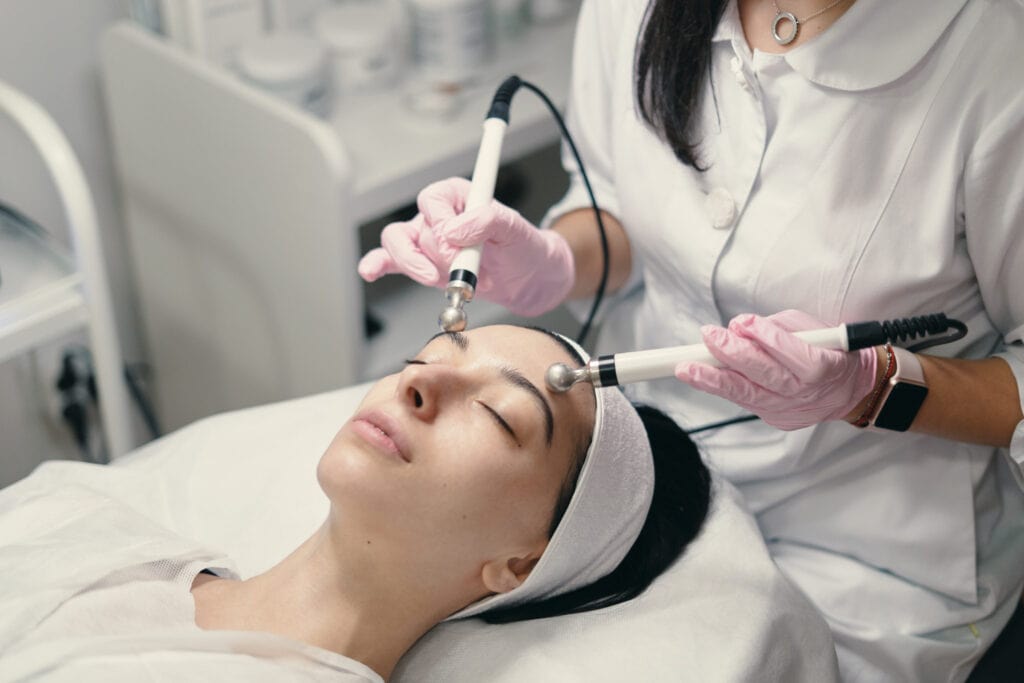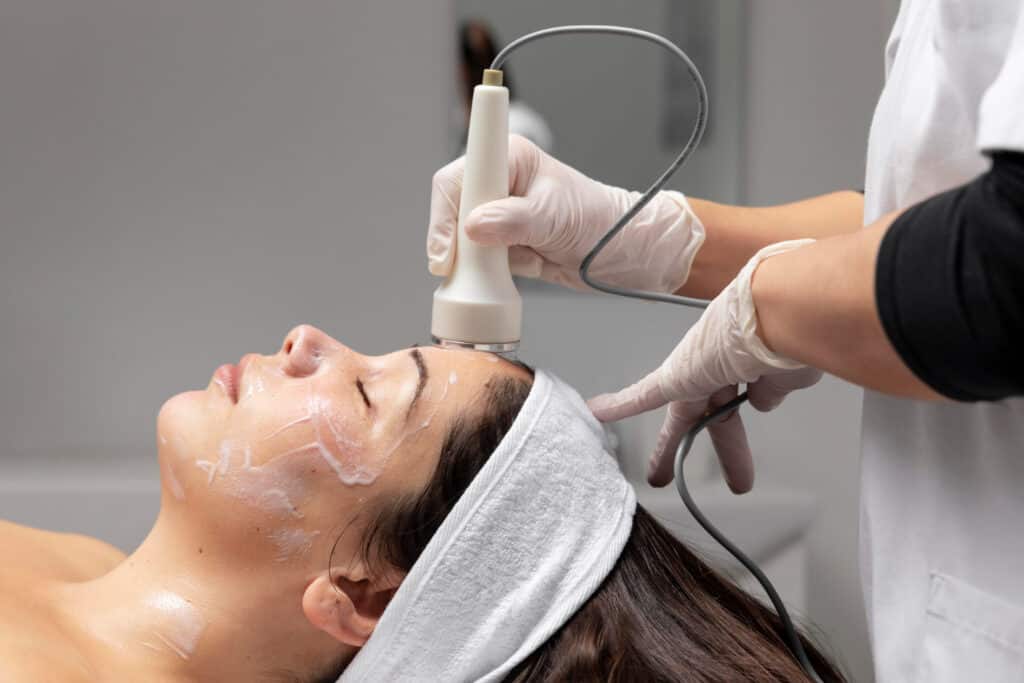
How Technology Is Transforming the Beauty Industry
Innovation has always been at the heart of the beauty industry, but in recent years, technology has elevated it to new heights. Technology is changing how people interact with and experience beauty products and services, from AI to AR, from high-tech beauty devices to customized skincare. Beauty companies can now provide highly customized experiences, increase the efficacy of their products, and boost customer satisfaction owing to the developments in digital tools.
The Rise of Artificial Intelligence in Beauty
Technology has significantly impacted the beauty industry, enabling brands to deliver highly customized solutions to consumers. AI-powered innovations are transforming skincare, makeup, and customer interactions, making beauty more accessible and efficient than ever before.
Personalized Skincare Solutions
Artificial intelligence is revolutionizing skincare by enabling brands to offer personalized solutions based on individual skin types and concerns. AI-driven skin analysis tools can assess skin conditions through smartphone cameras, providing users with tailored product recommendations. Brands like Neutrogena and Olay use AI-powered diagnostic tools to analyze fine lines, wrinkles, pores, and pigmentation. These tools help consumers find the best skincare regimen without visiting a dermatologist.
Virtual Beauty Assistants
Virtual beauty assistants with AI capabilities are increasingly common on the websites and applications of beauty brands. These helpers respond to consumer inquiries, recommend appropriate goods, and provide beauty advice using chatbot technology and machine learning. For instance, Sephora’s chatbot helps customers make informed decisions by offering tailored skincare and makeup recommendations.
Augmented Reality: Changing the Way We Shop for Beauty Products
Augmented reality has revolutionized how consumers interact with beauty products, bridging the gap between online shopping and in-store experiences. With AR-powered tools, beauty brands are offering immersive ways for customers to explore products, making the decision-making process more convenient and enjoyable.
Virtual Try-Ons
Gone are the days when consumers had to rely on trial-and-error to find the right foundation shade or lipstick color. AR enables users to try on makeup virtually before making a purchase. Brands like L’Oréal and MAC have developed AR-powered apps that allow customers to see how a product looks on their skin in real-time.
Enhancing In-Store Experiences
Many beauty retailers are integrating AR mirrors in their stores to provide an interactive shopping experience. These mirrors let shoppers experiment with different makeup looks and hair colors without physically applying any product. This technology not only improves customer engagement but also reduces product wastage.

3D Printing: Customizing Beauty Products Like Never Before
A new era of personalizing beauty products is being ushered in by 3D printing. Brands can use this technology to create creative solutions that meet the individual needs and preferences of every person. This change is lowering waste and increasing access to high-quality products while enabling customers to enjoy beauty in a more sustainable and customized way.
Personalized Makeup
3D printing is making its way into the beauty industry by enabling brands to create custom cosmetics tailored to individual needs. For instance, companies like Mink and MODA offer 3D-printed makeup, allowing consumers to choose colors and textures that match their preferences.
Prosthetic and Skincare Innovations
3D printing is also being used to create custom prosthetics for burn victims and individuals with skin conditions. Researchers are exploring ways to print skin grafts and artificial skin, potentially revolutionizing dermatological treatments.
The Impact of Biotechnology on Beauty
With its creative approaches to sustainable and efficient skincare, biotechnology is significantly changing the beauty sector. Beauty brands can develop high-performing products that meet contemporary consumer demands while lessening their impact on the environment by incorporating scientific advancements.
Lab-Grown Ingredients
Biotechnology is helping beauty brands develop sustainable and effective ingredients. Instead of sourcing ingredients from plants or animals, companies are using lab-grown alternatives. For example, lab-grown collagen and hyaluronic acid provide the same benefits as natural ingredients but with a lower environmental impact.
Sustainable Beauty Solutions
With the growing demand for eco-friendly beauty products, biotechnology is playing a crucial role in creating biodegradable and non-toxic alternatives. Brands like Biossance use bioengineered squalane, a moisturizing ingredient derived from sugarcane instead of shark liver.
Smart Beauty Devices: The Future of Skincare and Haircare
Smart beauty devices, which provide users with individualized solutions for their skincare and haircare routines, are growing more sophisticated and widely available as technology advances. These gadgets improve beauty treatments by combining automation, AI, and sensors, making them more efficient and practical than before.
High-Tech Skincare Tools
Smart beauty devices are becoming a staple in skincare routines. From facial cleansing brushes with AI sensors to LED light therapy masks, these devices help consumers achieve professional-level skincare at home. For example, Foreo and NuFACE offer smart facial toning devices that use microcurrents to enhance skin firmness.
Smart Haircare Solutions
Haircare has also seen technological advancements with smart hairbrushes and scalp analyzers. Brands like Kérastase and Dyson have introduced AI-driven hair tools that adjust heat settings based on hair type, preventing damage and improving hair health.
Blockchain Technology in the Beauty Industry
Blockchain technology is being used more and more in the beauty sector to guarantee authenticity, security, and transparency. Decentralized digital ledgers can help beauty brands increase consumer trust and optimize supply chain management while guaranteeing that their products are sourced ethically and meet high quality standards.
Ensuring Product Authenticity
Counterfeit beauty products pose a significant risk to consumers. Blockchain technology helps combat this issue by providing transparent supply chain tracking. Customers can scan a QR code to verify the authenticity of a product and ensure it comes from a legitimate source.
Ethical Sourcing and Transparency
Blockchain also promotes ethical sourcing by allowing consumers to trace the origins of beauty ingredients. This transparency helps brands build trust with environmentally conscious customers.
The Role of E-Commerce and AI in Beauty Retail
Online shopping has never been easier or more customized owing to the combination of e-commerce and artificial intelligence, which has revolutionized the beauty sector. AI-powered innovations improve consumer experiences by providing smooth shopping experiences and personalized product recommendations.
Personalized Shopping Experiences
AI-driven recommendation engines enhance e-commerce experiences by suggesting products based on customer preferences and past purchases. Platforms like Amazon and Sephora use AI to curate personalized beauty recommendations, increasing customer satisfaction and sales.
Subscription-Based Beauty Services
Subscription beauty boxes have gained popularity due to AI’s ability to curate selections tailored to individual tastes. Services like Ipsy and Birchbox use AI algorithms to analyze customer preferences and send customized beauty products every month.
The Influence of Social Media and Influencer Marketing
Social media is now a major factor in determining consumer engagement, influencing beauty trends, and influencing purchase decisions. YouTube, Instagram, and TikTok are examples of platforms that function as virtual runways where influencers post real-time product recommendations, reviews, and tutorials while beauty brands display their newest offerings.
AI-Powered Influencer Collaborations
Social media has played a massive role in shaping beauty trends, and AI is now helping brands collaborate with the right influencers. AI tools analyze engagement metrics, audience demographics, and authenticity to identify influencers who align with a brand’s image.
Virtual Influencers
The rise of virtual influencers, such as Lil Miquela, is changing beauty marketing. These AI-generated personas endorse beauty products and engage with followers, blurring the lines between reality and digital influence.

The Future of the Beauty Industry with Technology
The beauty industry is poised for even greater transformation as technology continues to advance. Innovations in artificial intelligence, augmented reality, and biotechnology are expected to shape the next generation of beauty products and services, offering consumers more personalized and effective solutions than ever before.
Hyper-Personalization
Hyper-personalization will become commonplace in the beauty industry as technology advances. From AI-generated beauty routines to DNA-based skincare, customers can expect highly personalized solutions that are tailored to meet their specific requirements.
Ethical and Sustainable Innovations
Technology will drive sustainability in the beauty industry by reducing waste, creating eco-friendly formulations, and promoting responsible sourcing. Brands that embrace these advancements will stay ahead in an increasingly conscious market.
AI-Powered Dermatology and Diagnostics
AI-driven dermatology apps are expected to become more sophisticated, helping users detect skin issues early and providing professional-grade insights. These advancements will make skincare more accessible and preventive rather than reactive.
Conclusion
We never would have predicted how technology would change the beauty industry. Biotechnology, blockchain, AI, and AR are just a few examples of the innovations that improve consumer experiences, boost product effectiveness, and advance sustainability. The beauty business will become more ethical, inclusive, and individualized as technology develops further, providing customers with more intelligent and efficient beauty products.
For businesses, staying ahead of technological advancements is crucial to remaining competitive. Embracing innovation will not only improve customer satisfaction but also contribute to the overall growth of the beauty industry. The future of beauty is undoubtedly digital, and those who adapt will lead the way in this transformative era.
